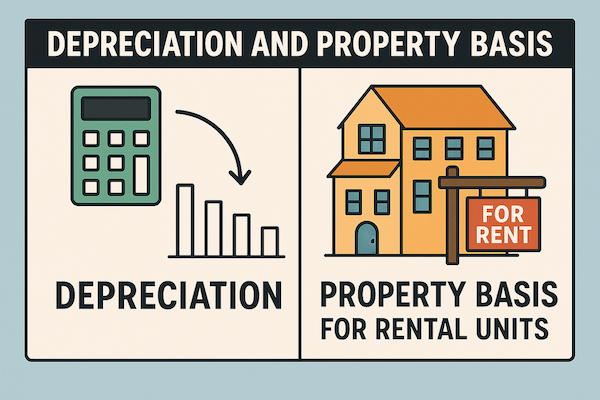If you own a rental property, knowing how your property basis and depreciation work can make a big difference in how much tax you pay — both today and when you sell. These two concepts form the foundation of how your property is valued for tax purposes, and they help you maximize deductions the right way.
What is “Basis” iin a Rental Property?
Your property’s basis is essentially what you have invested in it. It starts with your purchase priceand grows with certain costs like:
- Legal fees, title or recording costs, and transfer taxes
- Improvements that add value or extend the property’s life (like a new roof or HVAC system)
What’s not included? Land — it’s part of the purchase but not depreciable. And maintenance (like fixing a leaky faucet) doesn’t increase your basis, even though it’s deductible as an expense.
Keeping an accurate record of your basis ensures you claim the right deductions and calculate gain or loss correctly when you sell.
Understanding Depreciation
Depreciation lets you recover the cost of the building and certain improvements over time — as if the property is “wearing out.”
- Residential rental property is depreciated over 27.5 years.
- Commercial property uses a longer 39-year schedule.
You start depreciating when the property is ready to rent, not when it’s first purchased. Each year, you deduct a portion of the building’s value (not the land) as an expense. This can add up to thousands in annual deductions — but you’ll need to track it closely because depreciation affects your taxable gain later when you sell.
Don’t Forget Your Rental Expenses
Along with depreciation, rental owners can deduct operating costs — like repairs, insurance, taxes, and property management. These show up on Schedule E of your tax return.
And remember: security deposits aren’t income when received or expenses when refunded; they live on your balance sheet until forfeited.
💡 Example
If you buy a home for $300,000 and allocate $60,000 to land, you can depreciate the remaining $240,000.
That’s $8,727 per year in depreciation (240,000 ÷ 27.5).
In Summary
Depreciation is one of the best tax benefits of owning rental property — but it must be tracked carefully. Properly separating land value, recording improvements, and maintaining clean records ensures your return is accurate and audit-ready.
Download our Free Guide
Want a clear visual breakdown? Download our free “Rental Property Basis and Depreciation” handout – a quick reference for new and experienced landlords.

